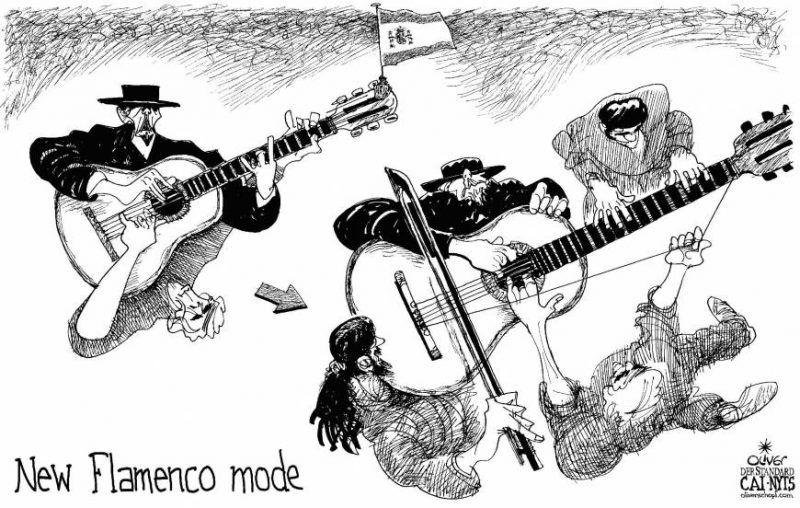
“I’m going to try to form a government,” said Spanish Prime Minister Mariano Rajoy as the results of the national election came in last Sunday night, “but it won’t be easy.” His right-wing People’s Party (PP) still won the most seats in parliament — 129 — but that was far down from the 176 seats it would need for an absolute majority, let alone the 186 it had before the election.
Pablo Iglesias, the man who founded the Podemos (We Can) party only two years ago, agreed with Rajoy on this, if on little else. “Ladies and gentlemen, this is the captain speaking in the name of Podemos,” he told a rally during the campaign. “We thank you for choosing the path of change. We’re expecting a bumpy ride with political turbulence.”
Podemos ended up with 69 seats, not bad for a 2-year-old party in its first national election — but it doesn’t seem interested in cooperating with the other left-wing party. “Hopefully Podemos would be willing to work with us,” said Juan Fernando Lopez Aguilar of the Spanish Socialist Workers’ Party (PSOE), which got 90 seats, “but so far I perceive a threatening mixture of arrogance, self-infatuation and condescension.”
“If the socialists or PP had done nothing wrong, neither Podemos nor us would exist,” said Albert Rivera, leader of the even newer party, Ciudadanos (Citizens). Last January it was barely known outside Catalonia, with only 3 percent support in the polls. Last Sunday, Ciudadanos got 14 percent of the national vote and 40 seats. So forming a new government in Spain is going to be a long and messy process.
Ever since the dictator Francisco Franco died and democracy returned to Spain 40 years ago, only two parties have mattered at the national level. The PP was the traditional right, close to the Catholic Church, and getting most of its votes from rural areas and older voters. The PSOE was traditional left, and got the urban vote, the young and what’s left of the working class.
The PP and the PSOE alternated in power, and during the three-decade boom after Spain joined the European Union nobody much minded the lack of viable alternatives. Then came the world financial crisis of 2008, with stagnant or falling wages for most Spaniards and an unemployment rate that reached 27 percent.
Each party had a turn at trying to deal with the crisis, and each cut the national budget, rescheduled or repaid as much debt as possible, and imposed severe austerity on the population. Even Spain’s population began to fall, as the young left in droves to find work elsewhere in the EU.
Maybe all that austerity has finally worked. This year the Spanish economy is growing at 3 percent, the highest rate in the EU, and unemployment is down to 21 percent. But that’s still higher than anywhere else in the EU except Greece, and it’s too late for a lot of voters. They don’t believe that either traditional party’s policies had much to do with the upturn in the economy (and a lot of them don’t even believe the statistics that say there is one).
So there was plenty of room for a new party offering an end to austerity, and for a while it looked like Podemos was it. It was anti-capitalist, its 36-year-old leader wore a ponytail, and it promised radical change. Some people worried that it had “Venezuelan” tendencies, but a year ago the polls suggested that it could even come out ahead of both traditional parties in an election.
Not so fast. Since January the other new party, Ciudadanos, has been pulling away the more nervous people among the mass of disaffected voters who were once willing to back Podemos. Ciudadanos also has a 36-year-old leader (no ponytail) who talks about radical change, but it is really a center-right party that sits comfortably in the middle of the road, long left empty by the traditional parties of left and right.
That split the protest vote, so now Spain has four major parties, and creating any sort of coalition government is going to be very hard. The arithmetic means that either the PP or the PSOE must be in any coalition that can command a majority in parliament, but Ciudadanos swears that it will not join any government that it does not lead.
Podemos is being equally difficult, saying that it will ask its supporters to vote on joining any coalition. (Being fed up with both traditional parties, they would probably say no.) So unless there is a “grand coalition” between the PP and the PSOE — which is also very hard to imagine — it may not be possible to form a new government at all. In which case, after two months, there must be another election — and you can forget the economic recovery.
Hard times do not usually make people more moderate and open to compromise. Spain is a perfectly reasonable country that has managed its democracy well for 40 years, but it may just have made itself ungovernable.
Gwynne Dyer is an independent journalist whose articles are published in 45 countries.
